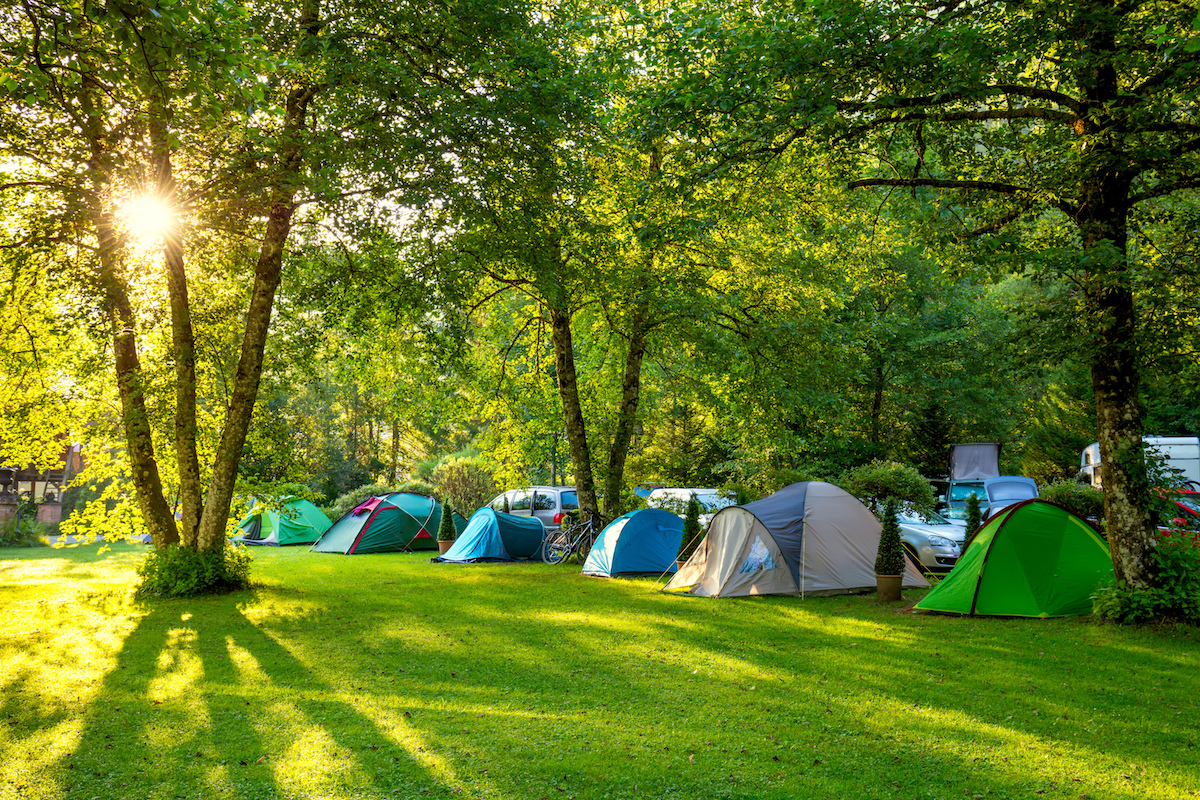An Official Site
It’s often best to take your first few camping trips to an official camp site. Here you should have the things you’ll not likely to have if you go off-the-beaten track wild camping (see below). You should get a flat bit of ground to pitch your tent on and most camp sites have toilets, a shower block, hot and cold water and many will offer you an outdoor electricity hook up if you like so you can power up your gizmos and even rig up electric lights if you like.
Many sites will have touring caravans on them too and will have shops and sometimes cafes and restaurants. Some even have leisure facilities like swimming pools all on site.
Camp sites vary tremendously though from ‘fairly basic’ to incredibly well-equipped as to what they offer so it’s wise to read reviews online before you visit.
One of the world’s leading tent manufacturing companies, Vango, have a number of useful online guides to camping including this guide to camping for families, which suggests you bring along a compass, but not in case you get lost (although its handy if that happens of course too).
The Camping and Caravanning Club is the biggest membership organisation for campsites in Britain and has an online directory of sites.

Tolpuddle Martyrs’ Festival 2016. Dorset.
© Jess Hurd/reportdigital.co.uk
Festival Camping
Most festivals set up temporary camp sites with portaloos and stand pipes for cold water whilst the festival is on.
These usually provide the bare minimum you need but as everyone is in a party mood most people accept they’re not going to be able to keep as clean as usual.
It’s worth considering though that if the weather is wet during the festival these temporary camp sites can turn in to ‘mud baths’ and camping equipment and everything else can get so spoilt so fast a lot of people just abandon it when they level (many festivals collect abandoned camping gear and send it off to charities to be used in other parts of the world where accommodation is needed in emergencies).
So the message with festival camping is usually not to spend too much on high quality camping equipment!

Wild Camping
Searching the web there seems to be a lot of disagreement as to what ‘wild camping’ actually is. One site suggests its remote areas you can reach in a motorhome, another that its staying in a pod in a fairly remote site but still with a hot tub on site, a third that it means travelling light to the middle of nowhere and seeing no one for days.
For most people though it’s option 3: Wild camping means leaving the safety net of the organised camp site behind you and just pitching a tent wherever you like – within reason.
Wild camping provides a real sense of freedom and getting back to nature but there are some things to be aware of before you do it.
Firstly, unlike on an official campsite there will probably be no access to hot water, toilets, showers or shops – you need to bring everything with you, and find a flat-ish bit of ground to pitch your tent on.
Secondly you need to be sure that where you are allowed to camp where you choose to camp – if it’s private land there’s a chance the owner may be unhappy, but making sure you don’t leave any mess and take everything with you when you go should help, and is the responsible thing to do anyway.
Thirdly it’s best to know what you’re doing before you go, particularly if you’re going really ‘off grid’ – ideally camp with someone with past experience of wild camping the first few times to get all the insider tips or see if there’s a course you can go on at your local outward bound centre.
Winter Camping
Camping in winter can be on an official site (Though may close between October and Easter so check before you roll up) or ‘wild’ , but whatever you choose make sure you have a tent that’s fit for the elements and if you’re wild camping in particular make sure you know what you’re doing – it’s essential you’ve taken a course that includes some winter camping advice.
Most tents you can buy from quality manufacturers such as Vango will have a grading system which will tell you whether they are ‘4 season’ (or for the most extreme conditions ‘5 season’) which means they can withstand snow and ice as well as gales and rain. A good example is the company’s XPD expedition tent in to which they’ve poured all their expertise gathered from supplying shelter to countless expeditions over the last 50 years, from pioneering Everest trips to recent Himalaya expeditions and listening to athlete feedback. Super tough it weighs in at just 4.4kg.
Don’t venture out with anything that doesn’t make the grade.
Glamping
Glamping, or ‘Glamorous-Camping’ has become fashionable in recent years as a type of camping on organised sites that’s of a higher quality than regular camping.
The tents, and quite often buildings made of wood so rather more than tents, are usually supplied and fully fitted by the campsite offering glamping, rather than you bringing your own tent.
Currently glamping sites are trying to out do each other to provide ever more amazing facilities, services and locations – it’s a real booming area of the travel industry.
Here’s a recent Guardian guide to 10 of the best in Britain.
Depending on where you book you can expect things like beds, comfortable furnishings, wood burning stoves, barbecues, private showers and much more.
Staying in them is equated to a hotel stay and often prices are similar.






